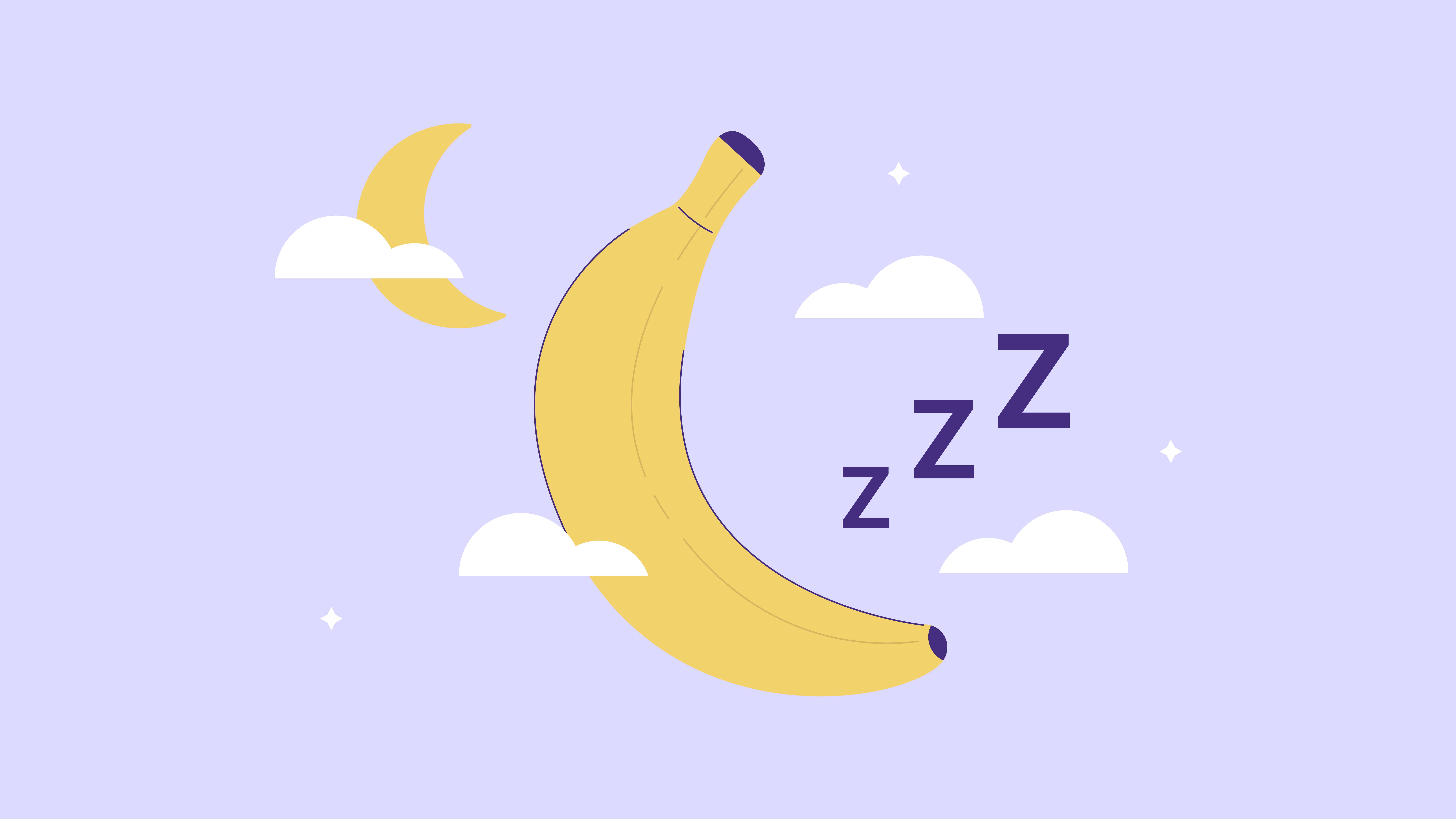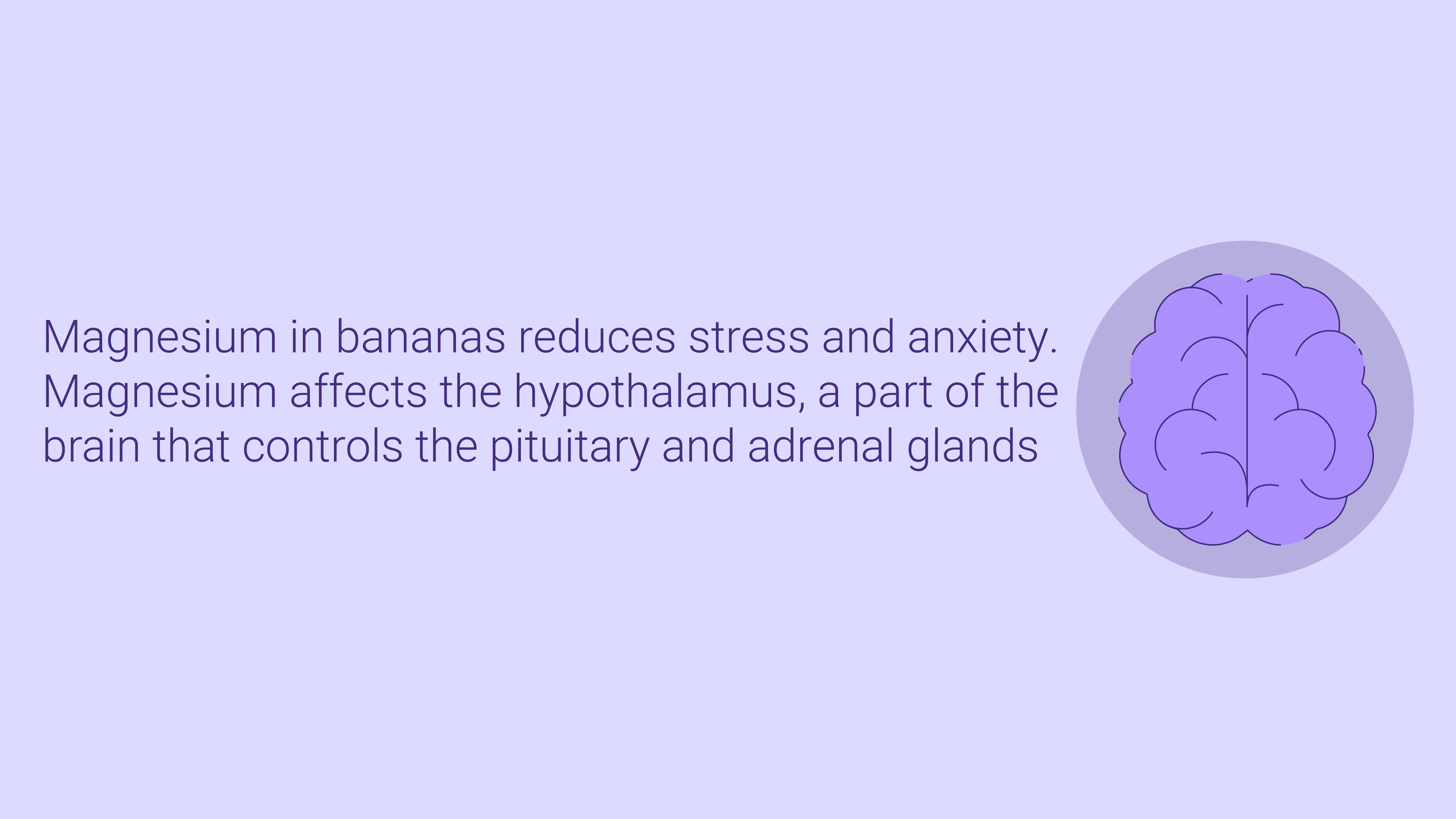
Can a Banana Before Bed Help You Sleep?
Bananas are one of the best bedtime snacks. Bananas are rich in potassium, magnesium, and vitamin B6, nutrients that not only promote better health, but may even improve the quality of your sleep.
In our article, we share how eating a banana before bed can lead to a good night’s sleep. We also recommend other sleep-inducing snacks and share the foods you should avoid before bed.
Improve Melatonin and Serotonin Levels
Bananas contain an amino acid called tryptophan that increases the production of melatonin and serotonin. We need to consume tryptophan because the body can’t produce it naturally. Vitamin B6 converts tryptophan into serotonin, a neurotransmitter that regulates melatonin production.
Melatonin is a sleep-inducing hormone that controls your circadian rhythm, also known as the sleep-wake cycle. Melatonin is strongest at night so your body can prepare for sleep.
Reduce Insomnia
Over 60 million Americans have insomnia—part of the problem is magnesium deficiency, which causes sleep disruptions and makes it difficult to fall asleep. Magnesium calms the nervous system and works alongside melatonin to control your sleep-wake cycles. One banana contains 32 milligrams of magnesium, and eating one before bed relaxes tense muscles.
Magnesium improves GABA levels, a neurotransmitter responsible for reducing brain activity and relaxing the muscles. The muscle relaxant properties of magnesium reduces symptoms of Restless Leg Syndrome by soothing overactive nerves.
Lower Blood Pressure
Those with high blood pressure are at risk of developing other medical conditions, including heart disease. Stress causes high blood pressure which can worsen due to sleep deprivation. When we don’t get enough sleep, the body produces more cortisol which in turn raises blood pressure further. However, potassium lowers blood pressure by easing tension in blood vessel walls, improving circulation.
Potassium regulates sodium levels, which affect blood pressure. High sodium levels disrupt the kidney’s ability to filter blood, increasing blood pressure.
Bananas are rich in potassium—eating one banana gives you 422 milligrams of potassium. The American Heart Association recommends consuming 4700 milligrams of potassium per day to lower blood pressure.
Reduce Stress and Anxiety

Magnesium in bananas reduces stress and anxiety. Magnesium affects the hypothalamus, a part of the brain that controls the pituitary and adrenal glands. Without magnesium, these glands increase stress hormones and cause anxiety.
Potassium is a natural muscle relaxant. Stress and anxiety cause muscles to stiffen, but potassium helps reduce muscle contractions and soothe tension. You may feel fewer aches and pains in the morning when you consume more potassium.
Other Sleep-Inducing Snacks
Other foods also promote sleep if you’re not a fan of bananas. These foods improve melatonin levels and provide vitamins and minerals, which can improve sleep quality. For example, nuts contain tryptophan which increase serotonin and melatonin production.
Drinks
While it’s better to avoid coffee at night, other drinks, like herbal teas, induce sleep by calming frazzled nerves and relaxing tense muscles. Many sleepy teas use herbs that promote calm and relaxation. Some drinks contain natural sugars instead of refined sugars, preventing sugar spikes which disrupt sleep.
Chamomile Tea
Herbal teas, like chamomile, don’t contain caffeine and won’t keep you awake at night. Chamomile tea is a natural sedative.
Tart Cherry Juice
Instead of grabbing a soda, reach for a glass of tart cherry juice instead. Tart cherries contain melatonin and phytochemical procyanidin B-2, a chemical that protects tryptophan as it travels to the brain.
One study found that drinking a glass of cherry juice before bed improves insomnia. Half of the participants with chronic insomnia experienced better sleep when they drank an 8-ounce glass of tart cherry juice before bed.
Milk
Milk is a good source of magnesium. Drinking a glass of 1 percent milk an hour before bed increases serotonin production, relaxing muscles and calming the nervous system.
Nuts and Seeds
Nuts and seeds are high in tryptophan and magnesium, promoting a good night’s sleep.
Walnuts
Walnuts are a good source of tryptophan, which increases melatonin production. Walnuts are a nice healthy substitute if you’re craving a crunchy snack. To deepen the flavor, lightly toast the walnuts and add to a greek yogurt for a healthy snack before bed.
Pumpkin Seeds
Pumpkin seeds contain tryptophan and magnesium to help you fall asleep. Pumpkin seeds pair well with cottage cheese, or you can sprinkle the seeds with garlic powder, cinnamon, or sea salt to enhance flavor.
Almond Butter
Instead of snacking on cookie dough or frosting, curb those sweet cravings with a spoonful of almond butter. Almond butter is a healthy fat and contains magnesium to help relax your muscles and induce sleep.
Carbohydrate-Rich Foods
Eating carbohydrate-rich foods in small amounts before bed induces sleep. Carbohydrates enable tryptophan to reach the brain and increase melatonin production.
Cheese and Crackers
Pairing whole-grain crackers with cheese provide complex carbs and lean protein, allowing tryptophan to travel to the brain. Tryptophan can’t cross the blood-brain barrier without the help of a carrier protein, like cheese.
Bowl of Cereal
Cereal and milk is a classic breakfast staple, but also an excellent late-night snack. Low-sugar cereal contains high-glycemic carbs that induce sleep, while the calcium in milk increases melatonin production.
Sweet Potato
Sweet potatoes are a complex carbohydrate and contain potassium. Complex carbohydrates boost tryptophan and serotonin levels.
Foods to Avoid Before Bed
Some foods should be avoided at night, no matter how bad the craving, like potato chips, ice cream, and dark chocolate. These binge-worthy foods may worsen cravings for more—you could end up consuming more calories than you need through foods that lack nutritional value. Plus, some of these snacks disrupt the digestive system and make it harder to fall asleep.
Fatty Foods
High-fat foods, including fast food, are hard for the stomach to digest and make it harder to fall asleep. Eating french fries or pizza right before bed is never a good idea. These foods take longer to digest, and if you’re trying to go to sleep after consuming these foods, the body has to digest and prepare for sleep at the same time.
Acidic Foods
If you have acid reflux, it might be better to avoid acidic foods right before bed, including citrus fruits, tomatoes, and strawberries. These foods aggravate acid reflux by increasing the chance of stomach acid escaping into the esophagus.
Caffeine
Caffeine is a stimulant that blocks sleep-inducing adenosine receptors in the brain responsible for sleepiness. While caffeine is in coffee and energy drinks, it’s also in dark chocolate. Dark chocolate may be healthier than milk or white chocolate, but it still contains small amounts of caffeine and can keep you awake.
Sugary Treats
Eating sugary treats after dinner may be a favorite nighttime ritual, but consuming dessert before bed causes blood sugar spikes and crashes and reduces orexin production. Orexins are chemicals released from the hypothalamus to relax muscles as the body prepares for sleep, but high blood sugar reduces orexin production.
FAQs
How can I stop nighttime hunger?
When it’s late at night and you start to feel hungry, don’t reach for potato chips. Instead, there are a few alternatives to stop nighttime hunger. One method is to drink a glass of water. You may be dehydrated instead of hungry. Another method is to eat a healthy snack, like cheese and crackers or peanut butter with apple slices.
Treating yourself to a bowl of ice cream may seem more appealing at night, but you may feel sick afterward or struggle with sleep. Keep unhealthy snacks out of sight or substitute junk food for healthier alternatives. If you don’t see that tub of ice cream or package of cookies, you’re less likely to indulge.
Is it okay to go to bed hungry?
While it’s not a good idea to binge-snack late at night, you shouldn’t go to bed hungry. Hunger pangs can make it difficult to fall asleep—the brain is more alert and may prevent deep sleep, a part of the sleep cycle vital to recovery. Instead, snack on sleep-inducing foods that won’t cause disruptions and avoid skipping meals.
What foods cause insomnia?
Foods high in fat and sugar worsen insomnia. These foods take longer to digest and make it harder to fall asleep. Spicy foods are another type of food to avoid at night because they contain peppers. Spicy peppers raise body temperature and increase the risk of heartburn and acid reflux.
What will help me sleep at night?
One way to unwind and prepare for sleep is to follow a sleep schedule. Setting a regular bedtime routine establishes a rhythm, so you fall asleep and stay asleep.
First, turn off any electronic devices. Too often, screen time cuts into sleep. Next, take a warm bath or shower—after you get out of the bath or shower, your body drops in temperature, increasing melatonin production. Then make sure your bedroom is cool and dark. Any source of light can disrupt sleep and reduce melatonin production.
What is the best natural sleep aid?
Some of the best natural sleep aids are essential oils and herbal teas if you’re struggling with sleep. Diffusing essential oils, like lavender, reduces stress and helps you relax. A cup of chamomile tea before bed promotes calm and reduces the risk of waking up at night.
Conclusion
Bananas are a compact fruit that packs many sleep-inducing vitamins and minerals, including vitamin B6, magnesium, and potassium. If you get hungry late at night, eating a banana or any other healthy snacks we listed can fill you up and curb those cravings. The next time you’re having trouble sleeping, grab a banana before bed.
